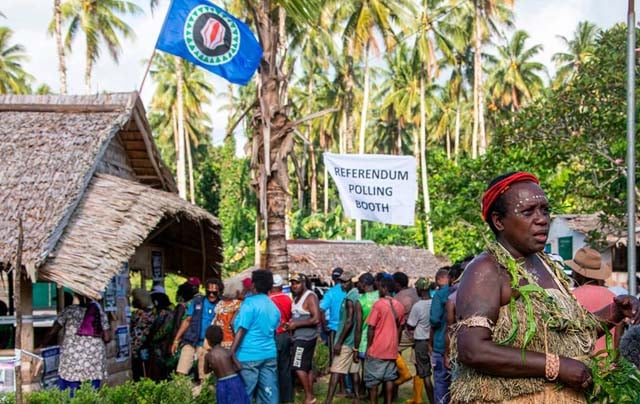News Flash
News Flash

SYDNEY, Dec 11, 2024 (BSS/AFP) - Papua New Guinea's copper- and gold-rich Bougainville region is set to declare independence by 2027, eight years after a landslide vote to secede, its leader said Wednesday.
The region -- home to about 300,000 people and a vast, long-shuttered copper and gold mine -- voted 97.7 percent in favour of independence in a 2019 referendum.
But some analysts say it is unclear whether Papua New Guinea will agree to let the region break away anytime soon.
The independence referendum capped a 2001 peace agreement that brought an end to a decade-long war between Bougainville rebels, Papua New Guinea security forces and foreign mercenaries, leaving as many as 20,000 people dead.
In 2021, Bougainville's rebel leaders and Papua New Guinea's government agreed on a process that would culminate in a "declaration of independence" by 2027.
"The people have spoken," Bougainville President Ishmael Toroama told reporters Wednesday on the sidelines of an investment conference in Sydney.
"The political timeline ends up in 2027," he said, citing the agreement to implement the referendum result sometime between 2025 and that date.
It would be up to Papua New Guinea's parliament to ratify the independence declaration, he said.
Papua New Guinean Prime Minister James Marape said he could not commit to the 2027 deadline, telling AFP in an interview on Tuesday that it was still subject to the parliamentary process.
"I cannot pre-commit the timeline," Marape said.
Both sides agree there is a need to "clarify" the parliamentary process, Marape said, noting that talks are being assisted by a mediator.
"The process and the events in parliament will determine what happens," he said.
"We have established those milestone timelines and we give respect to the timeline, but, again, as I said, subject to the parliamentary process."
- 'Reopening' copper mine -
Bougainville's leader Toroama said the region was "looking at reopening" the Panguna mine, which at one point accounted for more than 40 percent of Papua New Guinea's exports.
It operated between 1972 and 1989 but anger among locals over the environmental damage and distribution of profits triggered an uprising that forced its closure.
The mine is estimated to still hold more than five million tonnes of copper and 19 million ounces of gold -- worth billions of dollars at current market prices.
Toroama said there had been "significant progress" this year in redeveloping the mine after an exploration licence was granted to Bougainville Copper Ltd in January.
He predicted "increased on-site activity" at the mine next year and said there was "abundant opportunity" for investment but did not provide a target date for resuming operations.
The mine, once operated by Anglo-Australian mining giant Rio Tinto, still poses environmental concerns, according to a report released this month by environmental group Tetra Tech Coffey.
The Rio Tinto-commissioned study found that tailings from the mine -- which run into the Kawerong-Jaba River -- had "permanently changed the river system" and it would not "naturally return to how it was before the mine for at least 100 years".